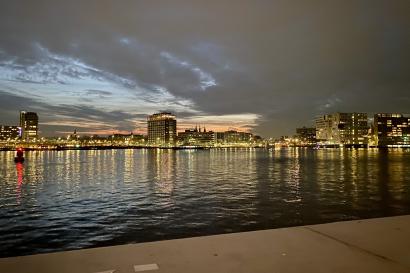A few weeks ago, I took the bus to meet a friend of mine at Dublin Airport. I’d avoided learning the bus routes for as long as possible up until this point, intimidated by the lines and the Leap Cards, but I finally made it a mission to figure public transport out. One LeapCard and a downloaded Moovit App later, I was venturing on my first solo bus mission, complete with a bus transfer.
I made it through the first leg of my journey alright, making my way from Rathmines Road Lower to Westmoreland Street, in the Temple Bar area of Dublin’s City Center. Then, confusion hit - Westmoreland Street is a very popular bus-stop area in the city centre, with multiple stops and a seemingly never-ending parade of buses. My app was telling me to take bus 747, but I couldn’t see anything like that in sight. In a moment of confusion, I ducked next to a store front and opened up my Google Maps, trying to orient myself.
I was refreshing the transit route when a woman approached me.
“You’ll talk to me,” she said, voice muffled through my headphones. I plucked them out of my ears and looked up, startled. “You’ve got a kind face, I know you’ll talk to me.”
Dublin is not my first city, though it’s the only one I’ve actually lived in. Still, I’ve spent weeks in Chicago, have been alive enough to know to be wary when a stranger approaches you, to take on the type of toughness that only city-natives really have.
“Pardon?” I asked, taking a small step back and glancing down on the time at my phone.
“I’m not asking you for money,” she said, and then, “I’m asking you to buy me food.”
I stared at her. She stared back at me. I blinked. She stared some more.
“Um." I shifting uncomfortably. And then, “Okay.”
Because standing in the middle of Westmoreland Street, crowds of people pushing around us, I was stunned. Because when another human being asks you to buy them food, what do you do? I thought briefly of all of the people I pass everyday on the streets, curled in sleeping bags, cups of change out. Of the brief time in my own life where circumstances made things difficult, made going to the food bank and stretching the given beans and pasta as far as possible. Of the way I might feel, if I someday ever have to ask someone else to buy me food, the embarrassment and humility that has to come from that.
I walked with the woman down to the Londis on the corner and stood silently as she anxiously glanced at me, picking up bananas, then a carton of orange juice, asking each time, is this okay--, can I get--?
Slowly, I asked her questions: where did she live, where did she sleep? She said she didn’t have a place to live, slept at the train station. I tiptoed around asking the obvious hows and whys.
She put her small assortment of groceries on the counter and tried to tell me in whatever way she could.
She said her thanks and bundled the bags up in her arms, leaving as I waited for the cashier to sort out the debit machine.
“Good luck,” I said in departure, lost for anything else to say.
The sales clerk had been silent during our interaction, but as the woman left, he looked at me and quirked his eyebrow a little. “Where are you from?” he asked. “America?”
“Yeah? California?”
“Ah.” He looked at me and then glanced towards the door where the woman had just left. “I see.”
Instantly, I felt shame, embarrassed. I was tentatively stunned throughout the entire encounter, this older woman telling me about her life, and the cynical part of me was already second-guessing everything she said. Was she telling the truth? Was I being scammed? Did it matter? Did this so obviously make me a foreigner, because I had stopped and listened to the woman, agreed to her when she asked, rather than continuing to walk on?
I left the store quickly, clutching the strap of my bag and feeling conflicted. I still had a bus to catch. I still didn’t know which one I needed to take. I was on the verge of asking someone when I saw “Dublin Airport” flash on the top of one of the buses, immediately hopping on.
On the forty-five minute bus journey to the airport, I tried to figure out what I felt, if there was a certain way that I should be feeling.
Any sense of kindness or goodness I might have felt was overshadowed by doubt and shame, by the distinct thought that I had been tricked, had fallen trap as another American tourist. I was conflicted, doubtful.
On the bus ride, I exchanged a few text messages with my brother. I told him about the woman I’d just run into, about how I didn’t know if I should feel good for helping her or ashamed for falling for a trap. Was it a good or a bad thing, what I’d just done? He replied quickly - does it have to be either?
At my home school, they talked a lot about being a “global citizen” - seeing the world from a different cultural perspective, embracing a new set of circumstances and experiences, and dealing with the complexities that come with that.
My experience with the cashier immediately made me equate stopping to talk to the woman as something that only an outsider would do, and in my head, being an outsider was a bad thing. It’s taken me time - lots and lots of time, as I seem to keep circling around these same ideas and issues - to realize that that’s not necessarily true.
Or maybe it is. Maybe I only believed her because of my naive Americanness, of my inexperience. Maybe my status as a foreigner made me easy prey.
Either way, that’s not necessarily good or bad. Maybe I was tricked, maybe I wasn't. Maybe I was just being kind, maybe I wasn't. I had the resources to give this woman food that she needed. It didn't have to be any more complicated than that.

Kaylie Padgett
<p>California to (nearish) Chicago to Dublin; creative writing major, gender studies minor. I am very excited to get lost.</p>





